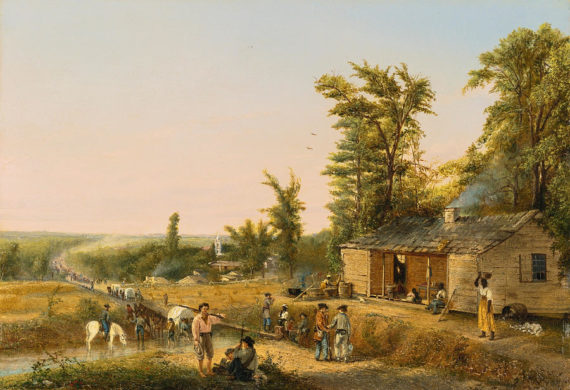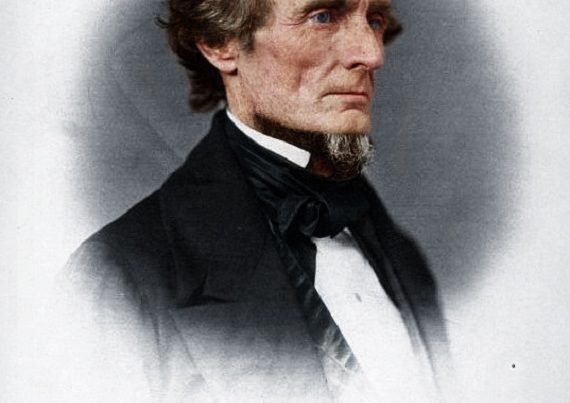When speaking at Abbeville’s “The 1607 Project,” someone from the audience came to me, after my talk—and the Abbeville audience was electric!—and said, “You really mean what you say.” It was a curious sentiment, for by implication, I could conclude that many speakers at that or other conferences merely go about the business of public speaking without investing personally in their words—that is, without regard for authenticity.
What did I say to evoke such a sentiment?
I said, “I love Thomas Jefferson.”
Yet this is not a paper on Jefferson. This is a paper about me.
In my recent videos with Donna Vitek on Jefferson, I have begun, in a manner soi disant, to call myself “Colonel Holowchak.”
I do so for two reasons, and my assessment below is based on my personal observations over decades, not controlled laboratory studies on human types.
First, it is a bit silly, playful, to call myself “Colonel,” and I like at times to be somewhat tongue-in-cheek, in a very deadpan manner (I love Buster Keaton), when I speak and write. As Voltaire once said:
Woe to philosophers who cannot laugh away their learned wrinkles. I look on solemnity as a disease. Gaity, laughter, and study are three sisters who should never be separated. I take them as my mistresses.
Second, though a Northerner by birth and as one who has spent all but eight years of a relatively long life in the North, I have come to love the South—hence, self-adoption of the moniker Colonel.
Southerners are animated, passionate, fiery, and dedicated to their causes. They love deeply, passionately, and deliberately. They are creative, and spontaneous, and their creativity is in large part the product of enjoyment of spontaneity. Southerners are also fond of order and stratification. They are pachyderms, but when aroused to anger, they do not forgive until they have slaked their anger.
Northerners, in contrast, are businesslike, bromidic—all cut from the same mold, dull, and unimaginative. They are easily moved to causes and they move from cause to cause without much regard for deliberation. They like to think of themselves as enlightened and open-minded, but they view open-mindedness autotelically—as an end, not a means. Northerners are also very thin-skinned, and so, they worry much about how other people see them. Consequently, fitting in is extraordinarily important.
In is Summary View of the Rights of British America—you know I would have to fit in somewhere Thomas Jefferson—Jefferson states that the American Colonists were British citizens by chance, but they have become British Americans by choice. He writes:
Our ancestors, before their emigration to America, were the free inhabitants of the British dominions of Europe, and possessed a right which nature has given to all men, of departing from the country in which chance, not choice, has placed them, of going in quest of new habitations, and of there establishing new societies, under such laws and regulations as to them shall seem most likely to promote public happiness.
One can readily see here, and in other parts of this underappreciated document, the germ of his Declaration of Independence, two years later. The Summary View makes many of the same points that Jefferson makes in his Declaration. That is perhaps why many scholars see the former to be redundant, or somewhat so, and not much worth study.
Yet the Summary View differs remarkably in one fundamental respect. It is an angry document, unlike the Declaration, and it is written by a man who truly believes what he writes. In that key regard, it is a uniquely Southern document—one that no Northerner of Jefferson’s day could have penned, at least, not with Jefferson’s persuasiveness, tone, commitment, and ire. Jefferson in the Summary View takes it on himself to lecture to the king, George III! Is it any wonder that Delaware-native John Dickinson—hmm, he too owned slaves and he was a Northerner; is that possible?—saw to it to rewrite, to tone down, much of what Jefferson crafted in their jointly created 1775 work, Address on the Causes for Taking up Arms?
In my next piece, I shall cover in detail Jefferson’s Summary View, and cover it as a document that only a Southerner could have created.
I conclude by iterating Jefferson’s points that we cannot control the place of our birth, but we can choose what to love and what not to love, where to live and where not to live. I love the South—even though I have removed this year from Virginia to Michigan, but that is due to age and my wish to be near to family and old friends in my senectitude!—and I love the crusty, sun-baked people, Whites and Blacks, who live in the South. Consequently, I choose to be considered a Southerner, not a Northerner, for my heart, like Jefferson’s, is in the South. Hence, there is a serious side for my preference for Colonel Holowchak!
Last, I love Abbeville and what its fine people—Donald Livingston and Clyde Wilson especially—are and have been doing to preserve and understand Southern culture, and to defend it from misrepresentative attacks by bromidic Northerners.







This was an enjoyable read and I am glad Dr. Holowchak chose to be one of Us. As Morris Dees, Woodrow Wilson and a list too long to post here chose Scalawagdom after being born here proves, being born here does not make one a Sothroner. They squandered their birthrights. What other infamous names should I have recalled to place at the top of my list?
Colonel Holowchak,
There is no need to apologize for your assumed rank. It’s a Southern tradition. Many a Confederate Veteran achieved rank in their community through leadership in the United Confederate Veterans, or other civic function, that they never approached in the army.
You’re welcome as a Southerner no matter where you live, too. I told my First Family of Virginia (FFV) aunt, at feeling guilty for living the last seventy years of her life in South Carolina, “Don’t worry – you’ll always be a Virginian, no matter where you are”. She was much relieved. The concept works for any Southern state – I have to say I was envious when visiting them on the Carolina coast. I also frequently find it necessary to console myself with the sentiment as Virginia is overwhelmed by the Federal Swamp to the north.
You’ve come by it honestly. Always at odds with most in the north, Mr. Jefferson knew where his friends were. You’ve simply taken his council.
Thank you. It was something I had to write for all the kindnesses shown to me by Brion, Don, and others at Abbeville….
Thank you, Colonel, for sharing your knowledge. I am grateful and endebted to you for that sharing.
My ancestors weren’t the free inhabitants of Great Britain…my ancestors were Scots and Irish…we were the expendable…we ended the Roman Empire at Hadrian’s wall and we ended the British Empire at Kings Mountain, Cowpens and Yorktown.
If only we could have ended New Britain’s Empire at Manassas…either battle would have been fine…if only.
Thanks for the kind words above!!!
There is one thing about us Southerners, we don’t call ourselves colonel unless we are one.
Ex-Navy so I prefer Capt’n !
I have always felt that British-America is what made this country great, until about 1960.